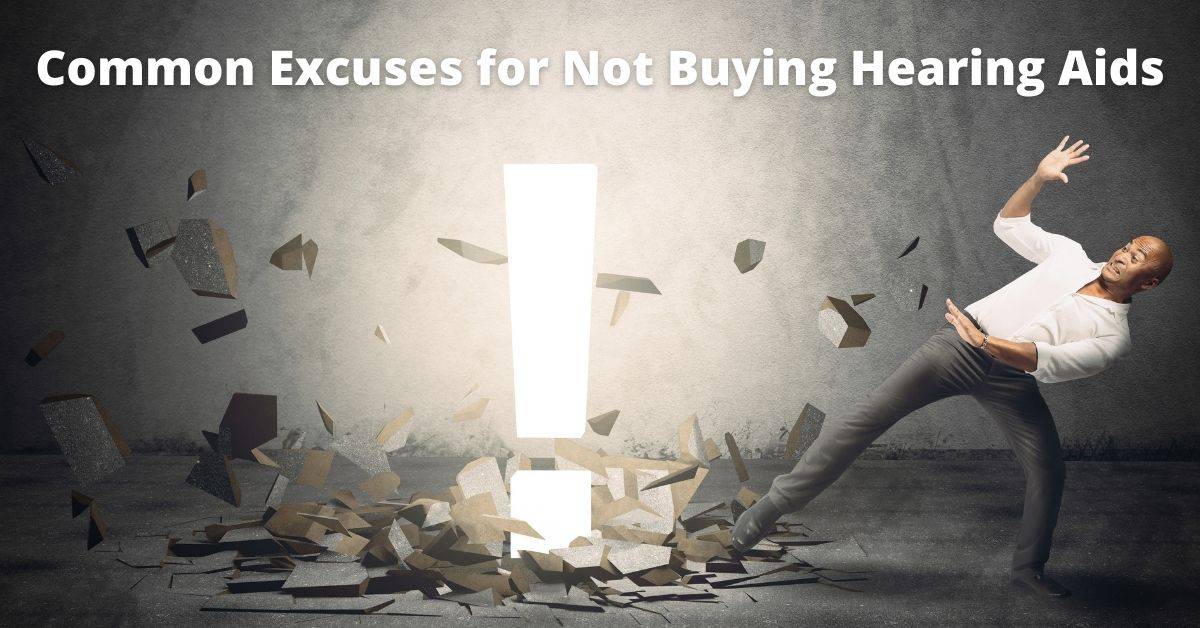- How to Recognize the First Signs of Hearing Loss - June 5, 2025
- Understanding the Connection Between Tinnitus and Weather - May 17, 2025
- The Most Unexpected Reasons Hearing Aids Can Malfunction - May 9, 2025
Hearing loss is incredibly common – over ten percent of the population and one in three people over age 65 live with some form of hearing loss. What is sadly less common is treating hearing loss. For people under 70, fewer than 16% of those with hearing loss use hearing aids. Over age 70 the statistics aren’t much better – less than 30% of those with hearing loss choose to treat their condition.
Most hearing loss is a permanent health issue – while it can’t be cured, treating hearing loss with hearing aids improves your quality of life and helps mitigate the health risks and cognitive strain that accompany hearing loss. Why don’t people use hearing aids when their health benefits are clearly proven? Let’s take a look at some of the common excuses people use for not treating their hearing loss:
Excuse: My Hearing Loss Isn’t Bad Enough
For many, hearing loss happens gradually and doesn’t cause them physical pain. While we certainly don’t wish pain or sudden hearing loss on anyone, these factors make it difficult to assess when your hearing loss is “bad enough” for hearing aids. In truth, the presence of any hearing loss should be treated. New studies are showing that even mild hearing loss causes a lag in cognitive performance.
Also important to understand is that the earlier you treat hearing loss the easier it is to adapt to hearing aids and the more natural speech will sound. As gradual hearing loss progresses, it not only makes hearing more difficult, it fundamentally reorganizes how the brain processes sound. This means the longer you wait to treat hearing loss, the more disorienting it can be to adjust to hearing aids (with practice however, hearing aids can still help at every stage of hearing loss).
Treating hearing loss when it is first diagnosed has the added advantage of helping curb the negative health effects untreated hearing loss can bring. Untreated hearing loss is linked to elevated rates of depression, anxiety, social isolation, falling accidents and cognitive issues including dementia. Treating hearing loss helps lessen the pressure hearing issues place on your overall health and quality of life.
Excuse: Hearing Aids Don’t Work
The truth is, not all hearing aids are created equal which is why it is important to work with an audiologist to find the right hearing aids for your needs. Online offers, discount and mail order hearing aids are often providing nothing more than an amplifier for your hearing. Treating hearing loss effectively involves a more nuanced approach.
Reputable hearing aids provide clarity alongside amplification, tailored to the specific pattern of your hearing loss. An audiologist fits your device to your ear and works with you to best match your hearing aid to your hearing loss. Reputable hearing aids rely on advanced digital sound processing to deliver clear and enhanced sound to your ear.
Simple amplification won’t help consistently with hearing loss, which means many so-called hearing aids on the market simply won’t work well. Truly treating your hearing loss means working with a hearing specialist to receive devices that fit your ear and match your hearing. Using reliable hearing aids, many people are surprised to find that hearing aids do work – they were just struggling with underperforming devices!
Excuse: I’m Too Young
We often hear people express that, somehow, they aren’t the right age to benefit from treating their hearing loss. Nothing could be further from the truth. Hearing loss can occur at any age and hearing aids can help manage hearing loss at any stage of life.
For those who claim they are too young for hearing aids, the issue often lies with perceiving that hearing aids will make them “feel old”. We’ve found that the relief hearing aids bring to your hearing can actually make you feel younger, while constantly struggling with your hearing and comprehension can be taxing on the body and mind. Additionally, people often have a misperception about the way hearing aids look and feel. Today’s hearing aids are far more sleek and discreet than the bulky designs people associate with hearing aids from decades ago.
That said, people of all ages experience hearing loss! And hearing aids have proven to be of great assistance regardless of when you begin using them. If you have noticed changes in your hearing, contact us today to schedule an appointment for a hearing test!

